Cloud computing and its incredible uses are rising by the day. Therefore, it is no surprise that cloud security is also of rising concern and importance. Cloud security companies rose to prominence due to the growing need for securing cloud platforms.
Top 10 Cloud Security Companies
The 10 best cloud security companies are:
- Astra Security
- Palo Alto Networks
- Qualys
- Symantec
- Intruder
- LookOut
- Sophos
- Probely
- Lacework
- Orca Security
This article will discuss the 10 best cloud security companies, the top methodologies opted by companies for conducting cloud pentests, as well the features to look for in a top 10 cloud security provider. Along with this the factors to consider when choosing a cloud security company will also be explained.
Top 10 Best Cloud Security Companies
1. Astra Security
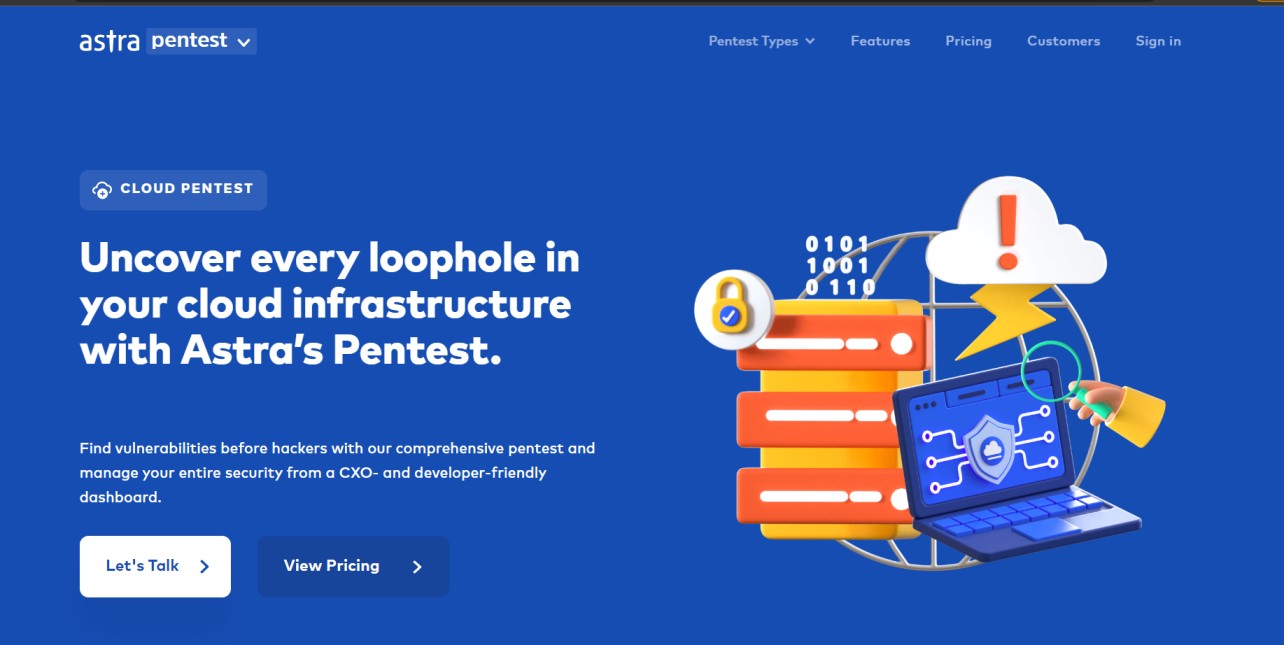
Features
- Scanner Capacity: Unlimited continuous scans
- Manual pentest: Available for cloud infrastructures
- Accuracy: Zero false positives
- Vulnerability management: Comes with dynamic vulnerability management dashboard
- Compliance: Helps you stay compliant with PCI-DSS, HIPAA, ISO27001, and SOC2
- Price: $199/month
Astra Security is the leading provider of cloud security to both cloud providers and customers alike. Its comprehensive vulnerability and malware detection make speedy remediation possible for any malware or vulnerabilities found.
It also provides world-class firewalls and continuous vulnerability scanning as well as periodic penetration tests to ensure maximum safety for your cloud environment.
Automated vulnerability scans
Astra’s vulnerability scanner is capable of conducting more than 8000 tests to detect vulnerabilities that match an extensive vulnerability database which includes OWASP Top Ten, SANS 25, known CVEs, and more.
Easy compliance checks
Continuous compliance scans ensure that compliance is maintained with industry-specific standards like HIPAA, PCI-DSS, GDPR, and SOC 2.
Intuitive Dashboard
Astra Pentest dashboard is unique in that it is entirely CXO-friendly and allows seamless collaboration between team members and pentesters for easy vulnerability fixing.
Manual Pentest
Astra’s comprehensive manual pentest can detect business logic errors, and conduct scans behind logins.
Zero False Positives
Astra’s Pentest team assures zero false positives in the report through thorough vetting after the automated scans.
Actionable Reports
It provides extensively detailed reports as well as POC videos to help organizations patch the vulnerabilities found quickly.
Gap Analysis
Astra also conducts a gap analysis of an organization’s security systems to find the gaps in security and performance that can be improved on.
Publicly Verifiable Certificate
Provision of publicly verifiable certificate upon completion of security analysis and remediation which enhances the company’s reliability and trustworthiness.
Pros
- Ensure zero false positives through thorough manual vetting of scan results.
- Periodic penetration tests to understand and remediate any exploitable flaws found.
- Has a comprehensive malware and vulnerability scanner.
- Helps with cloud vulnerability management.
- Provides round-the-clock customer support.
Cons
- Does not provide a free trial.
- More scope for integrations.
Verdict
Astra Security essentially replaces 3 cloud security testing services with one platform – a vulnerability scanner, manual pentest, and vulnerability management. Security experts go the extra mile to help you remediate issues quickly. It is like having a security team of your own. Also, full points for 24/7 chat support and customer service. Overall, it’s an incredible tool in any price range.
2. Palo Alto Networks
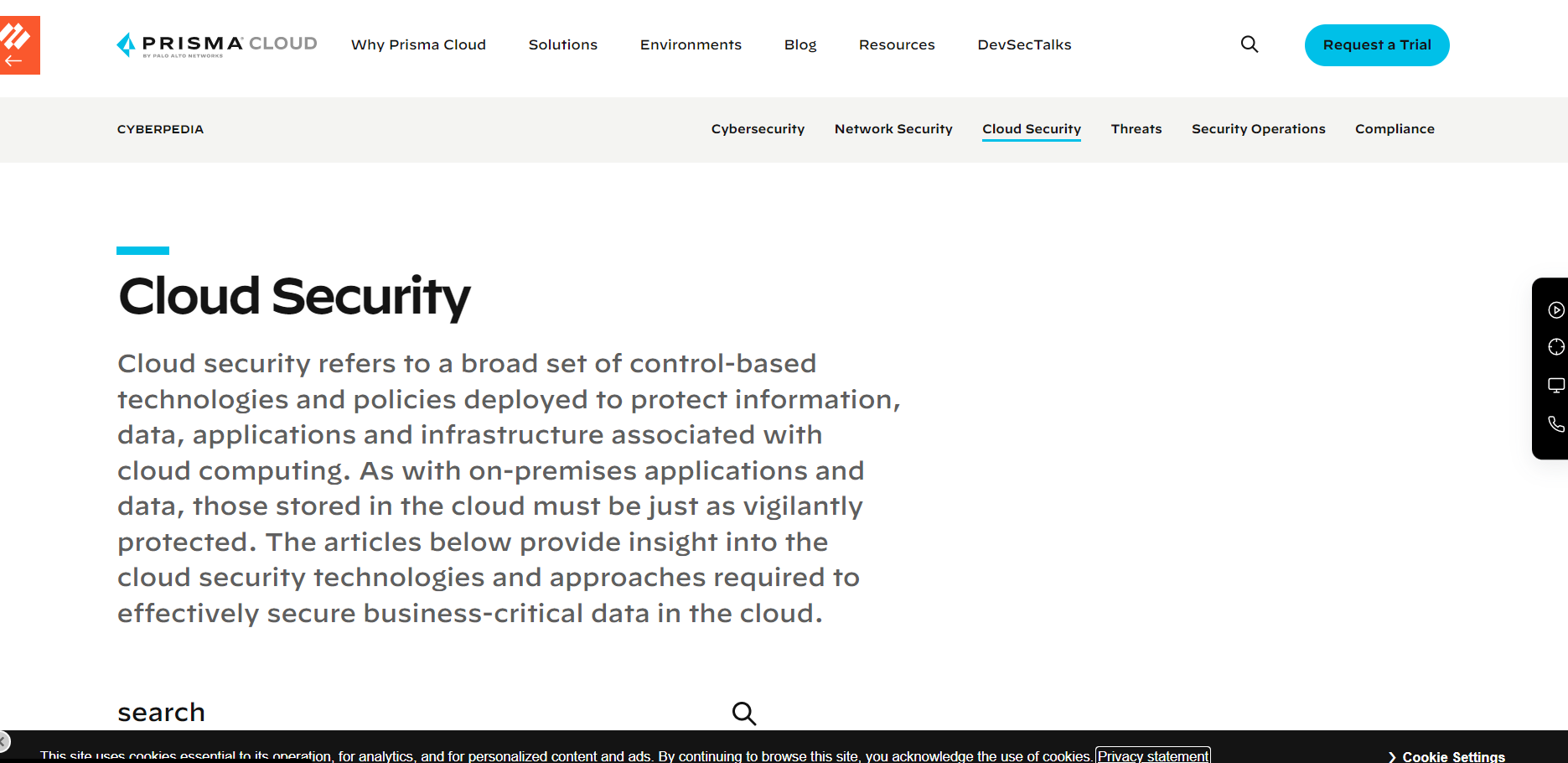
Features:
- Scanner Capacity: malware detection, zero-day monitoring
- Accuracy: False positives possible
- Compliance: PCI-DSS, HIPAA, GDPR
- Vulnerability Management: Yes
- Price: Quote upon request
Palo Alto Networks, is a top-notch cloud security network company that provides an all-around malware detection service as well as a next-generation firewall with high-end capabilities. It provides network speed and threat protection due to its streamlined organization.
Pros
- Palo Alto Network’s cloud security solution is easy to set up.
- Provides zero-day monitoring.
- Provides scope for integrations.
Cons
- Can be an expensive choice to opt for.
- No alerts for cloud performance degradation.
Verdict
Palo Alto Networks is a reliable all-around cloud security solution with the services offered by it. It can be an expensive choice to opt for but the solution is relatively easy to set up.
3. Qualys
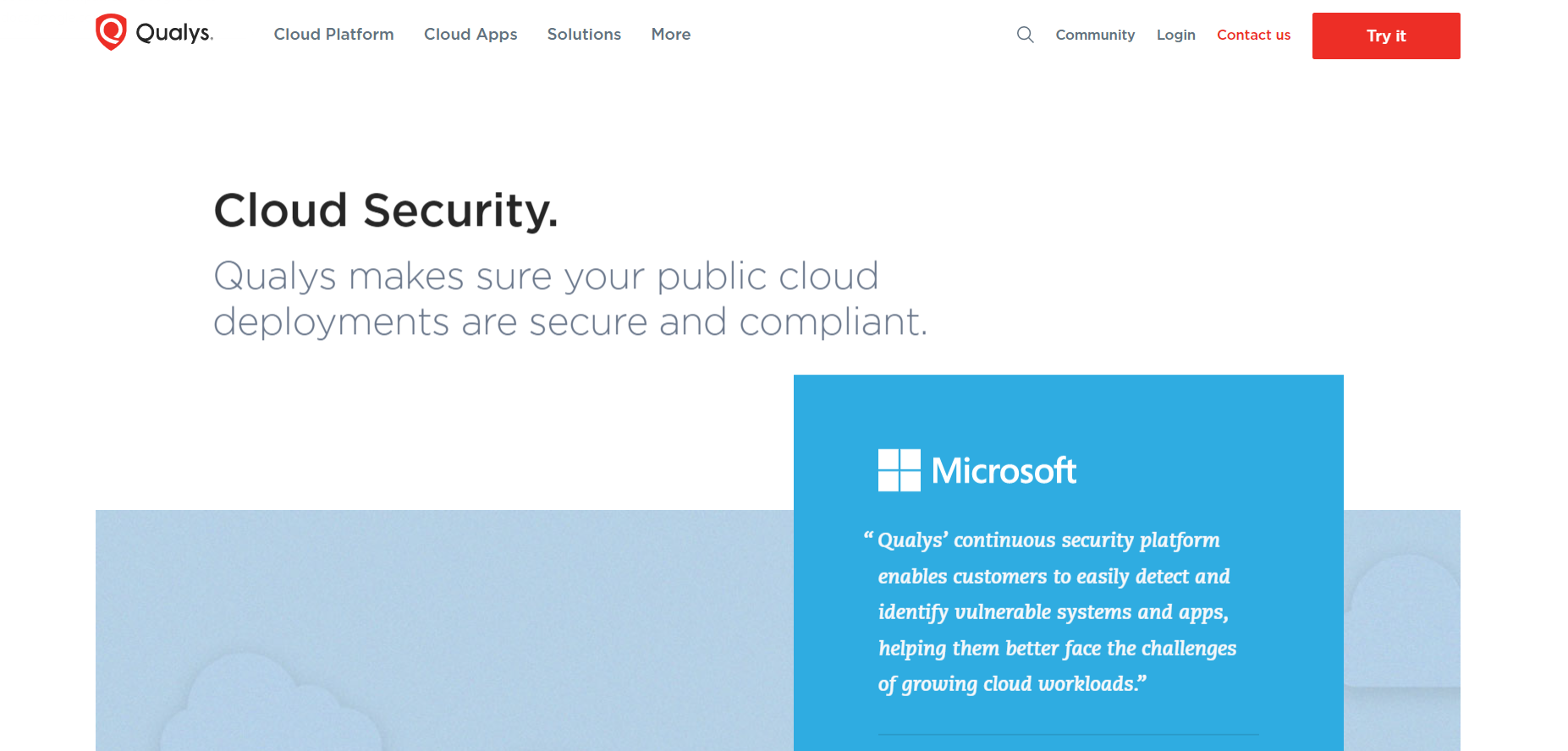
Features:
- Scanner Capacity: Web applications, cloud
- Accuracy: False positives possible
- Compliance: OWASP, ISO 27001, PCI-DSS, NIST
- Vulnerability Management: Yes
- Price: Quote on Request
Qualys provides its cloud customers with continuous monitoring, vulnerability management, and compliance solutions as well as web application firewalls. These services make Qualys a contender among top cloud security companies.
You can integrate the scanner with the Qualys continuous monitoring (CM) tool to keep an eye on your assets. The tool claims to be 99.999% accurate in its findings.
Pros
- Well-designed and easy-to-navigate user interface.
- Constant updates ensure the current security measures for the cloud environment.
Cons
- Limited scheduling options.
- Scans do not apply to all applications.
Verdict
Qualys is a popular cloud security company that offers continuous monitoring, vulnerability management, and scanning for cloud infrastructure. However, it has limited scan options that do not apply to all apps.
4. Symantec
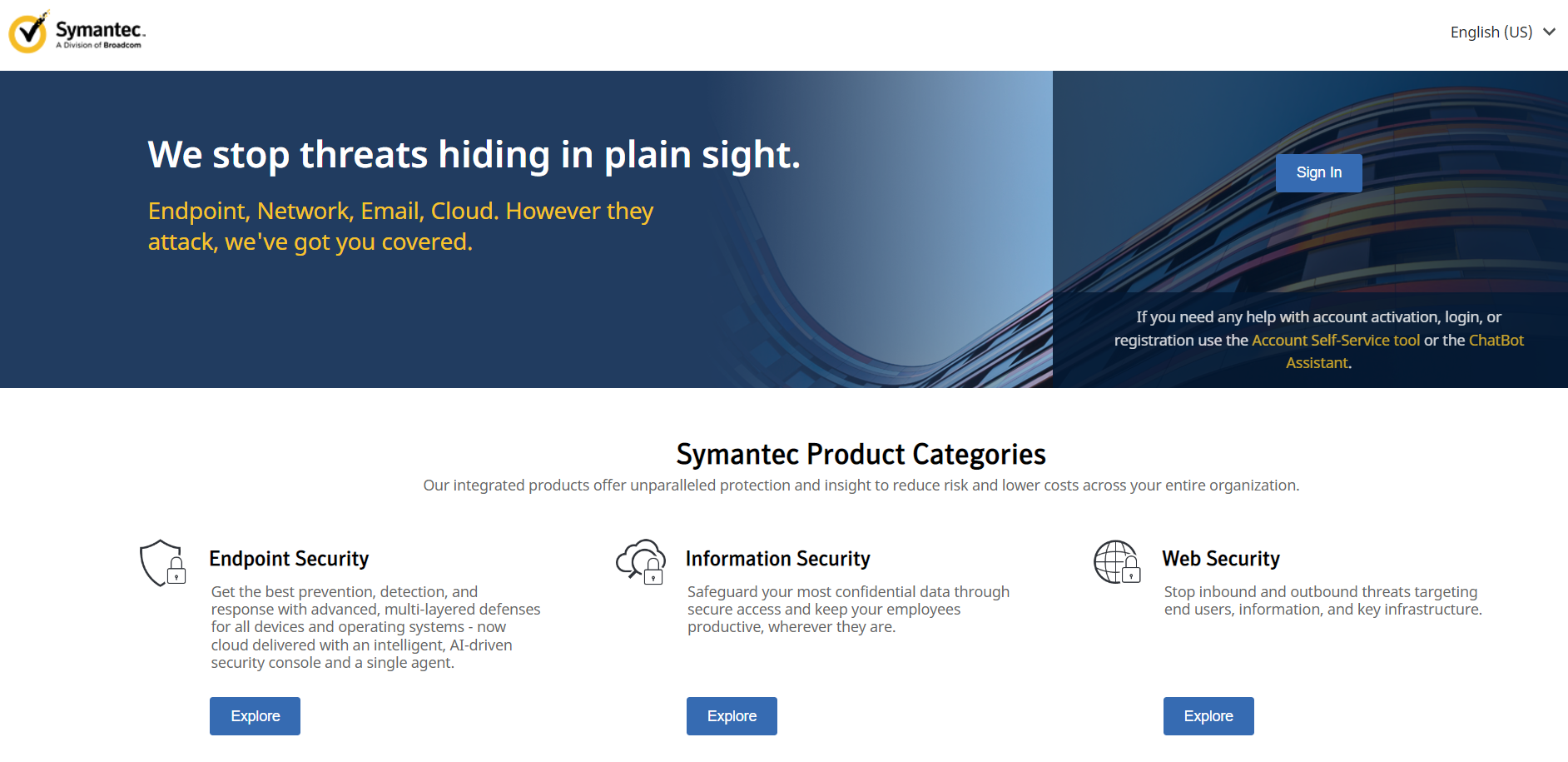
Features:
- Scanner Capabilities: Web scans, computer scans, cloud, networks
- Accuracy: False positives possible
- Integrations: Azure
- Expert Remediation: No
- Pricing: $39/ year
Symantec’s cloud workload protection provides automated security measures for your cloud providers and customers alike.
Symantec offers a client management suite that aims at deploying, managing, patching, and securing various assets.
Other services by Symantec include endpoint and identity security as well as information and network security.
Pros
- Provides end-point protection and threat detection.
- Also has centralized management.
- Has malware detection capabilities with the capacity for immediate remediation.
- Can be integrated within the CI/CD pipeline.
Cons
- A pricey cloud security solution that may not be feasible for small to medium-sized companies.
- Could provide better integration possibilities.
Verdict
Symantec can be a pricey solution, however, offers a wide range of cloud security measures such as endpoint, network, and other automated measures for cloud security.
5. Intruder
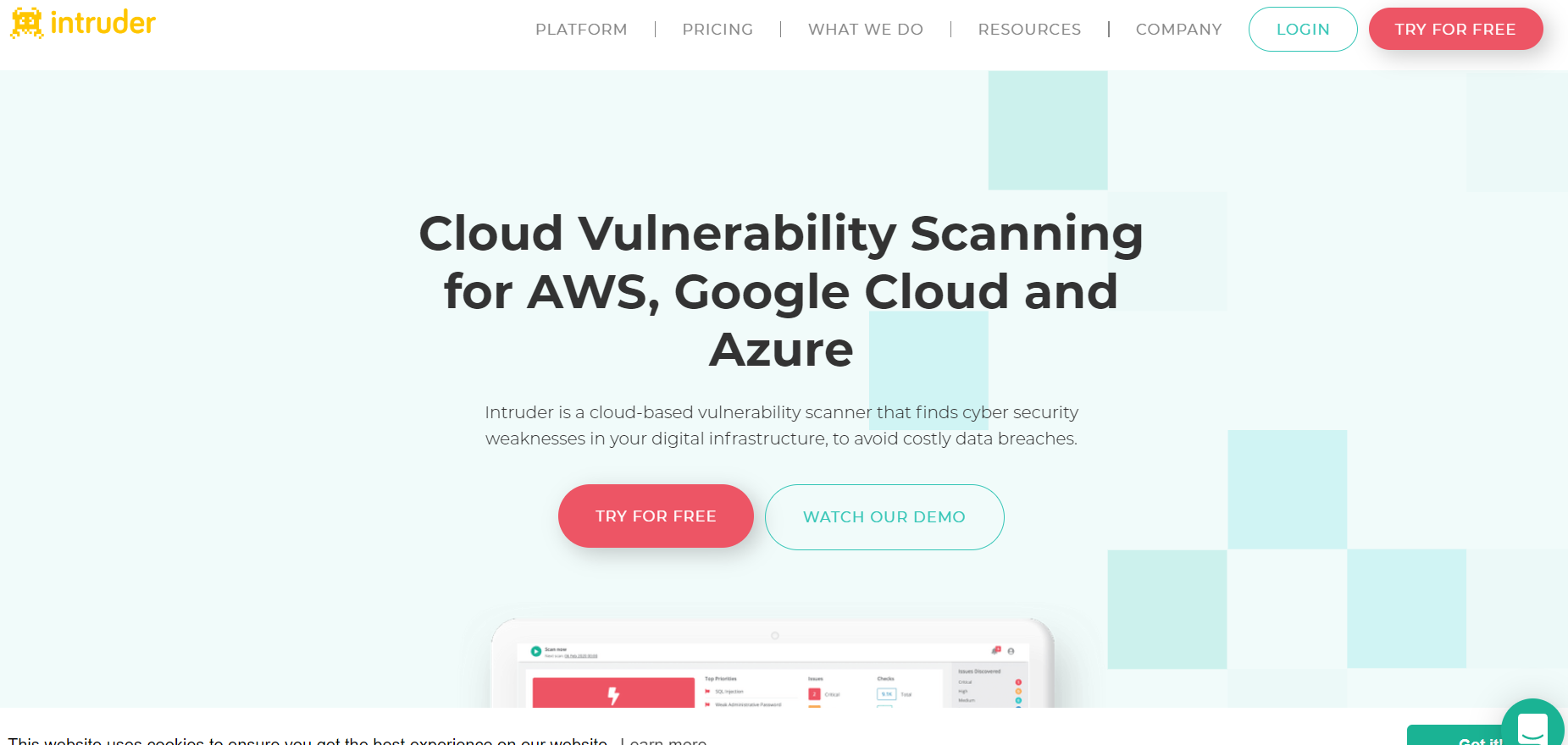
Features:
- Scanner Capacity: Websites, servers, and cloud
- Manual pentest: No
- Accuracy: False Positive Present
- Vulnerability management: No
- Compliance: SOC2, and ISO 27001
- Price: $1958/ year
Intruder is a cloud security scanning solution that provides extensive scans for the cloud environment. These services are available for AWS, Azure, and GCP.
It conducts continuous scans that are extremely exhaustive and capable of finding vulnerabilities.
It helps organizations monitor their attack surfaces for any changes or weaknesses that might leave them exposed on the web. It helps organizations take action on vulnerabilities based on their severity rating.
Pros
- Conducts hourly checks for new IP addresses and hostnames.
- Helps extensively with effective vulnerability management in the cloud environment.
- Multiplatform visibility with a single view into multiple cloud accounts.
Cons
- Does not provide key cloud security features like malware detection and firewalls.
- The reports provided could be more detailed.
Verdict
Intruder’s cloud scanning solution helps companies monitor weaknesses in the cloud. The tool is great in terms of expense and features offered however its testing reports could be more comprehensive.
6. LookOut
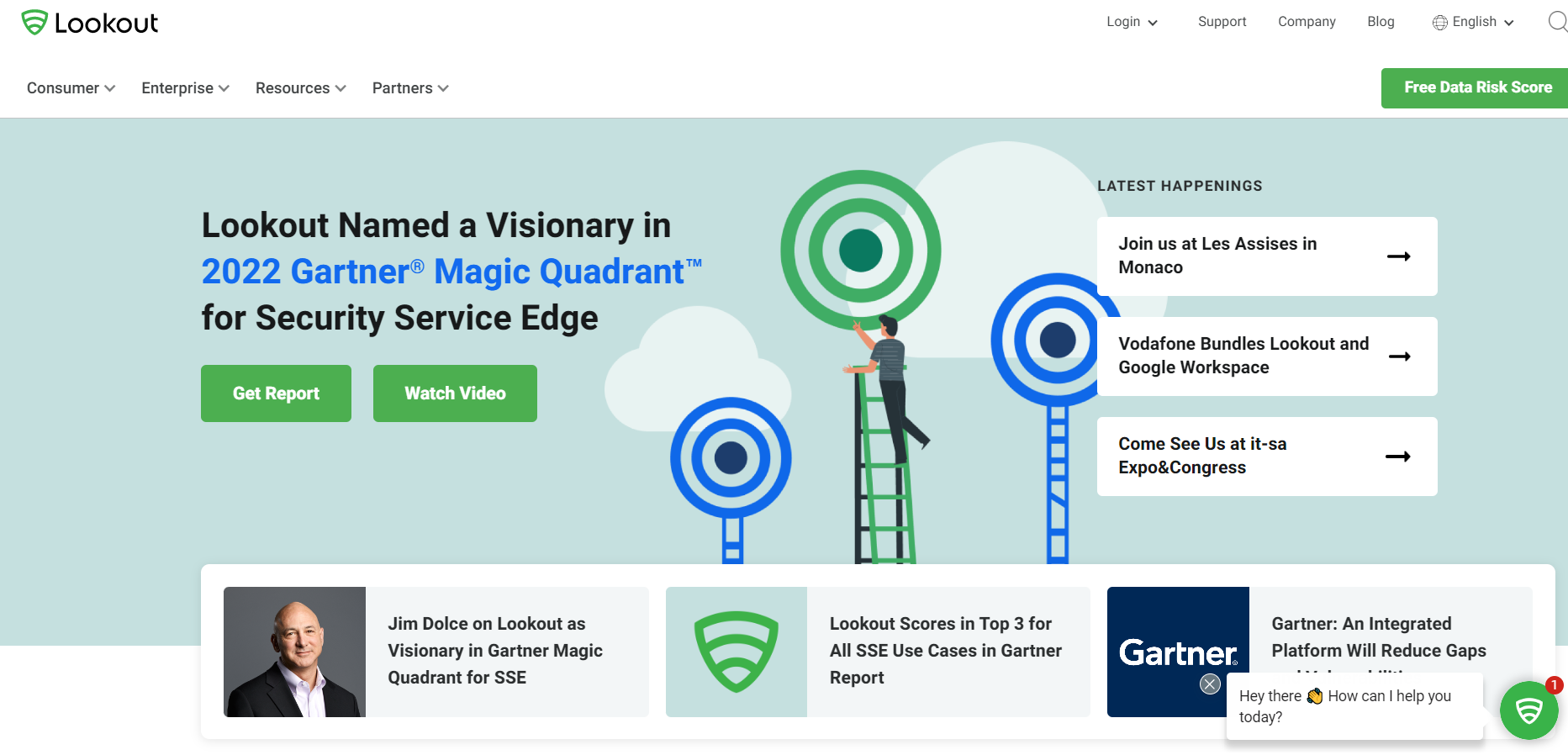
Features:
- Scanner Capacity: Threat detection
- Accuracy: 99.6% accuracy
- Vulnerability management: No
- Price: Quote on request
LookOut is yet another cloud data security company that protects data flawlessly through data monitoring, protection, cloud threat detection, and risk analysis.
Pros
- Provides data encryption
- Helps oversee the entire system
- Rarely experiences downtime.
Cons
- The solution can be pricey.
- Not regular about updates.
Verdict
Lookout offers multiple cloud security measures such as secure private access and cloud access, however, it can be pricey, therefore ensuring the services offered are exactly what is required for your assets.
7. Sophos

Features:
- Scanner Capacity: Web, Mobile, Cloud, Network and API scanning
- Accuracy: False positives possible
- Compliance: PCI-DSS, HIPAA, GDPR
- Vulnerability Management: Yes
- Price: Quote upon request
Established in 1985 Sophos Cloud offers simplified enterprise-level solutions for cloud security including 24/7 cloud threat detection and response, native protection, and security automation for DevOps.
These services are typically offered as part of Sophos’ larger suite of cybersecurity solutions, which also include endpoint protection, email security, and network security.
Pros
- Available for AWS, GCP, and Azure.
- Helps with security automation through DAST, SAST, and SCA analysis of code.
- Intuitive user-friendly dashboard.
Cons
- Can be expensive.
- Difficult to set up.
- Customer support could be better.
Verdict
Sophos is among the top cloud-based cybersecurity companies offering GCP, Azure, and AWS cloud security services. It can be difficult to set up but has good threat detection facilities.
8. Probely
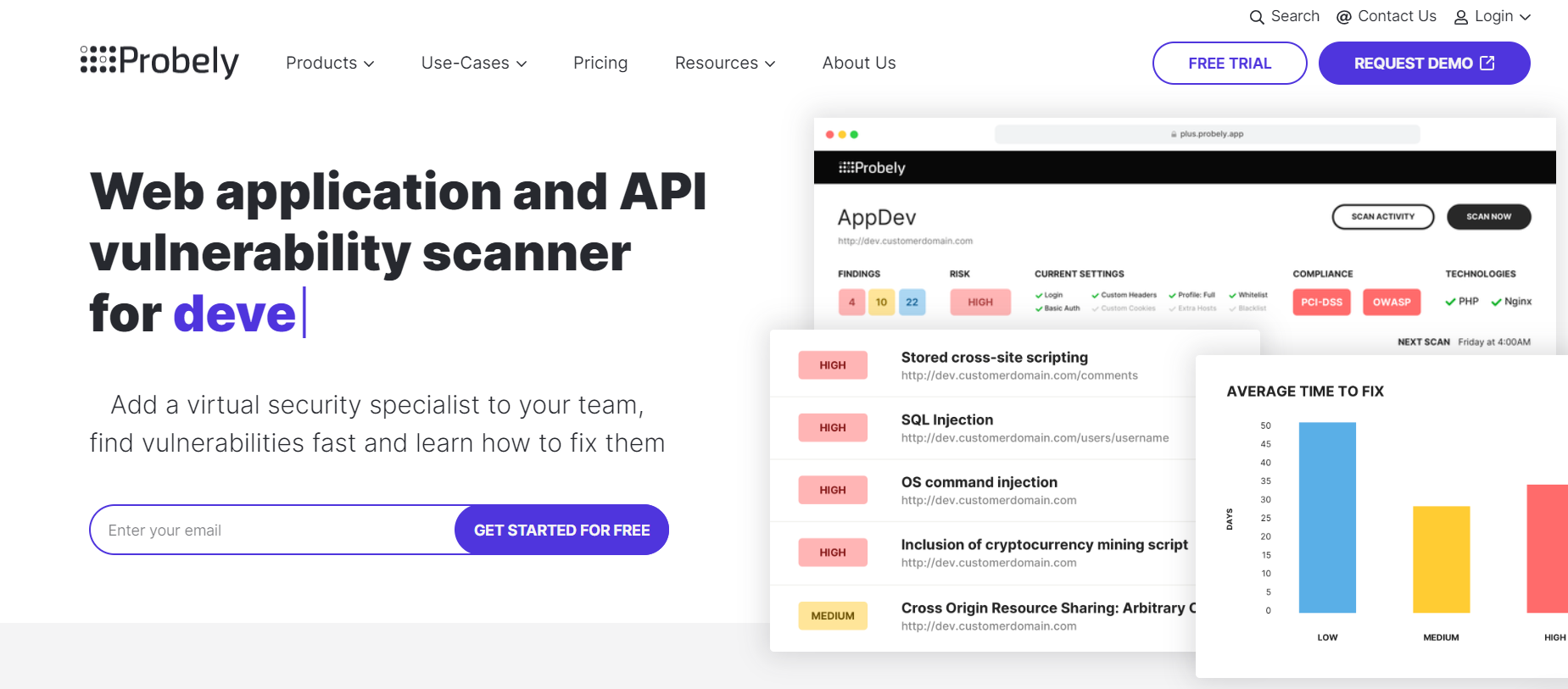
Features:
- Scanner Capacity: Web applications, APIs
- Manual Pentests: No
- Accuracy: False positives possible
- Vulnerability Management: No
This cloud security vendor provides a vulnerability scanner that allows the easy testing of security for web applications and APIs. It provides thorough reports that are easy to follow.
Probely comes with a free trial period of 14 days for all its packages and provides a Lite package at no cost.
Probely automatically prioritizes vulnerabilities based on the risk of the vulnerabilities and provides proof of legitimacy for each issue.
Pros
- Simple to use with continuous scanning.
- Wide range of tests.
- Good customer support.
Cons
- Could have better integrations.
Verdict
Probely is a vulnerability scanner that can scan the cloud infrastructure that offers a wide range of tests and 14-day trial period that can help customers decide on their services.
9. Lacework
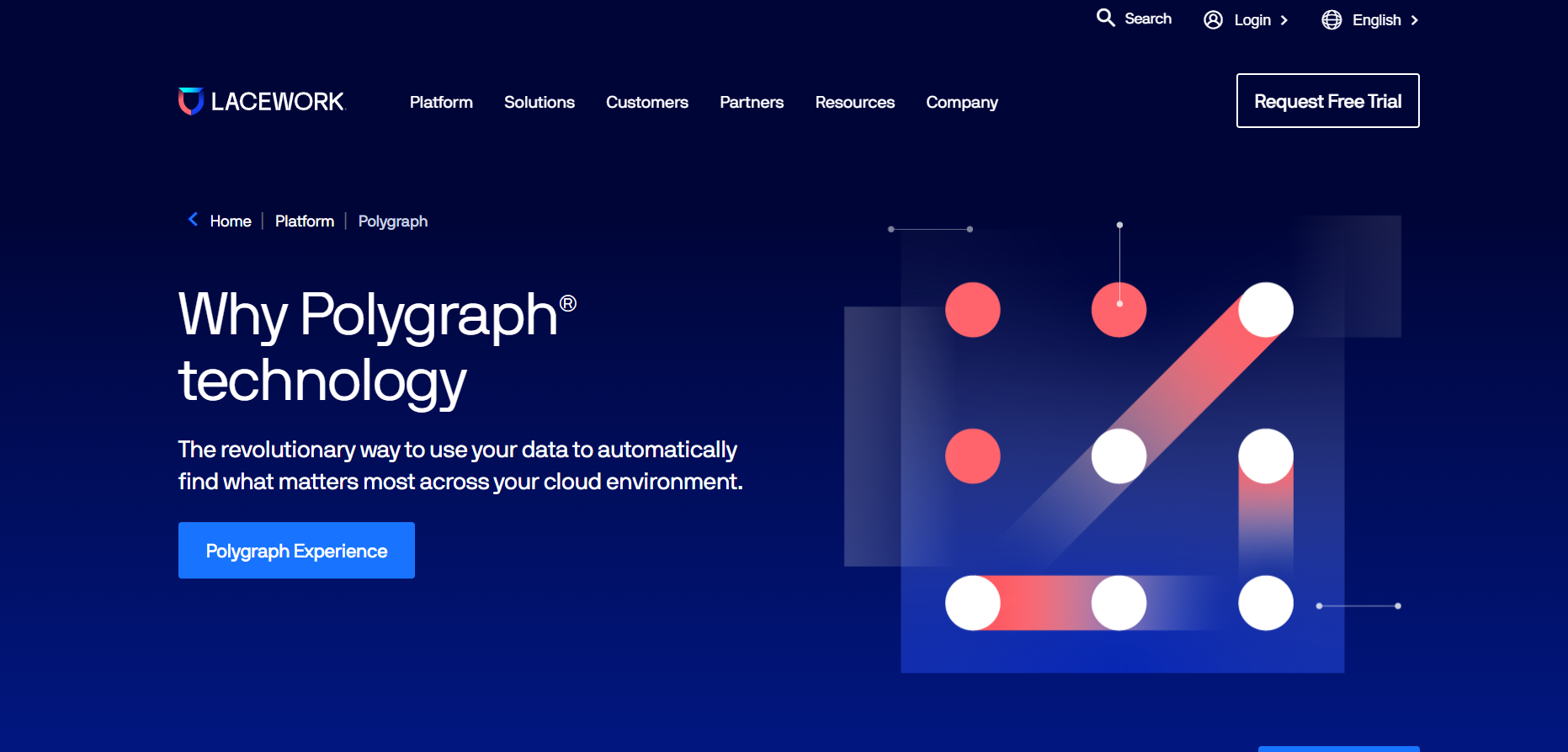
Features:
- Scanner Capacity: Cloud, code, Kubernetes
- Accuracy: False positives possible
- Vulnerability management: Yes
- Compliance: Yes
- Price: On Request
Lacework is a cloud security provider that provides threat detection and vulnerability management services for AWS, Azure, Google, Kubernetes, and other cloud platforms.
Lacework has built a platform to create visibility into threats across a multi-cloud environment. The data-driven cloud security platform by Lacework is called Polygraph. It helps you prioritize security fixes and remove silos in terms of risk mitigation.
Pros
- Good vulnerability management services.
- Available for AWS, Azure, and Google Cloud Platform.
Cons
- Can be difficult to set up.
Verdict
Lacework offers better visibility into the cloud environment’s security through its services of security posture management, and protection platform, however, its initial setup can be difficult.
10. Orca Security
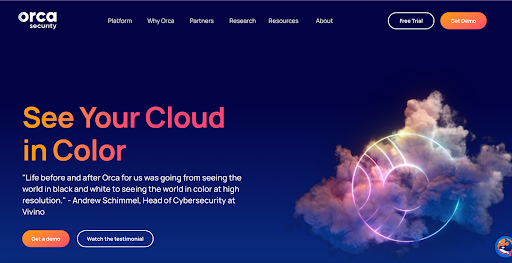
Features
- Scanner Capacity: AWS, Google, Azure
- Accuracy: False positives possible
- Vulnerability Management: No
- Price: Quote on Request
Orca security promotes a new approach to cloud vulnerability scanning called Sidescanning. It replaces the cloud agent and collects data directly from your cloud configuration.
Orca helps you cover vulnerabilities that might have escaped the agent-based vulnerability scanning solutions.
Pros
- Combines all your cloud assets in a single graph
- It supports more than 40 CIS benchmarks and all major security regulations
- Makes actionable data easily available to the right teams
Cons
- No upfront pricing provided
Verdict
The tool is well-liked with scanning capacities for all major cloud platforms, however, the lack of an upfront pricing point makes it difficult to choose.
Factors To Consider While Opting for Cloud Security Providers
1. Your Needs
Ensure that the needs of the company are prioritized and listed so that you can check the features offered by a potential cloud security service provider against your cloud-based company’s needs and requirements.
Cloud security solutions should be integrated into the CI/CD pipeline, and achieve and maintain certain regulatory requirements like that of HIPAA, PCI-DSS, SOC 2, and ISO 27001. It should also help maintain your side of the security according to the shared responsibility model.
2. Scalability
Ensure that the cloud-based security companies narrowed down provide a good scope for scalability if the need arises. This means that the solution must be capable of expanding or reducing its services by your company’s scaling.
Larger companies often require scalable services that can be extended based on their growing needs and company size.
3. Pricing
Ensure the pricing range offered by the cloud security companies you have narrowed down fits well within the budget set by your cloud-based company. The company you choose must also provide the necessary features for a seamless cloud security experience that holistically protects your confidential information.
4. Reputation
Yet another factor to consider when opting for cloud computing security companies is their reputation and experience in the field. Longer experience does not necessarily mean a better reputation all the time. Thus vet your choices thoroughly by going through reviews and recommendations by clients.
5. Customer Support
Understand the extent of the customer support provided by cloud security software companies. Check out reviews by current or previous customers to understand their customer service experience with the cloud security companies you are looking to hire.
Make sure that customer service is available when you need it through calls or e-mails for easier communication.
6. Features
Compare the different specifications offered by companies that provide cloud security. Features like business logic error and intrusion detection, scan-behind-logins, and holistic VAPT services are some important features that should be offered by a good cloud security company.
How To Choose Among The Best Cloud Security Companies?
Choosing among the best cloud security companies is a decision that should be taken after a lot of deliberation. Here are a few of the things to consider when making a choice:
- Updated and current security measures.
- Continuous vulnerability scanning.
- Encryption of data at rest and in transit.
- Regular Penetration tests.
Features Offered By Top 10 Cloud Security Companies
1. Continuous Vulnerability Scans
Cloud security companies should offer continuous and comprehensive vulnerability scans to assess and find any vulnerabilities within the cloud system. It should be able to find vulnerabilities based on known vulnerabilities from CVEs, intel, OWASP Top 10, and SANS 25. It should also be able to scan behind the logins and find any business logic errors.
2. Regular Penetration Tests
Regular penetration tests are crucial for the security of a cloud environment by both the customers and the providers to analyze and exploit the vulnerabilities within the security system.
The results of such a pentest will detail the flaws found along with the measures that can be taken to fix them before any malicious attackers take advantage of them.
3. Firewalls
A cloud-based firewall is a non-traditional solution to maintaining security for the data stored and transmitted with your cloud. These firewalls are hosted in the cloud itself. Cloud-based firewalls are easily scalable according to the needs of the cloud provider or the customer.
4. Data Encryption
Securing the data that is being transmitted and stored by cloud customers is critical. This is where data encryption comes into play. Encrypting data that is at rest and in transit using Transport Layer Security. This makes sure that the data can not be decrypted by the wrong parties thus maintaining confidentiality.
5. Intrusion Detection
Ensure that the company you choose for your cloud’s security has the right measures to detect any unauthorized activities and provide real-time alerts. Machine learning can help cloud security measures recognize patterns and thereby detect activities that fall outside the established patterns in security.
6. Compliance
Cloud security companies also ensure that as a cloud customer or a provider, the compliance you must maintain like HIPAA, PCI-DSS, GDPR, and other data protection laws are abided by.
3 Methodologies Opted By Cloud Security Companies For VAPT
Black Box
Black-box testing refers to the method of testing where the pentesting company is not aware of any details regarding the target. No information in the cloud environment is divulged making this the most realistic hacker-style testing. This type of testing is functional and focuses on the external features of the cloud.
White Box
White box penetration testing or glass-box penetration testing is where the testing team is aware of all the internal cloud details of the server to be tested. This type of testing is more required while applications are in development as it offers the testing to find vulnerabilities within the known internal cloud server.
Gray Box
Gray box testing or translucent testing is where the testing team is only partially aware of the relevant cloud information. It can be done by both end users and developers since it’s a midway ground between a black-and-white box.
Conclusion
This article talks about the best cloud security companies i.e. Astra Security, and others. It also details the features provided by the top 10 cloud-native security companies as well the factors to keep in mind when choosing the right one for your needs.
Different types of methodologies that are often adopted by cloud security solutions as a part of their VAPT services have also been explained in detail. With all this information at hand, you can now go for the best cloud security company to secure your cloud and cloud-based business.
FAQs-
1. What are the 4 major areas of cloud protection?
The four major pillars of cloud protection are:
1. Vulnerability Assessment and Penetration Testing
2. Data Encryption
3. Compliance
4. Proper Authentication and Authorization
2. What makes Astra a leader in security testing?
Astra Security is a leading cloud security provider with its comprehensive VAPT products, compliance-specific scans, continuous scanning as well as a solid website protection product.
Shared-responsibility model is a cloud framework that states that data security within the cloud environment is a mutual responsibility between the cloud provider and user. Both have their own set of security obligations to fulfill in order to keep the cloud and the data store secure.
![Top 10 Cloud Security Companies of 2024 [Reviewed]](https://cdn-blog.getastra.com/2022/08/Featured-Images-1.png)















